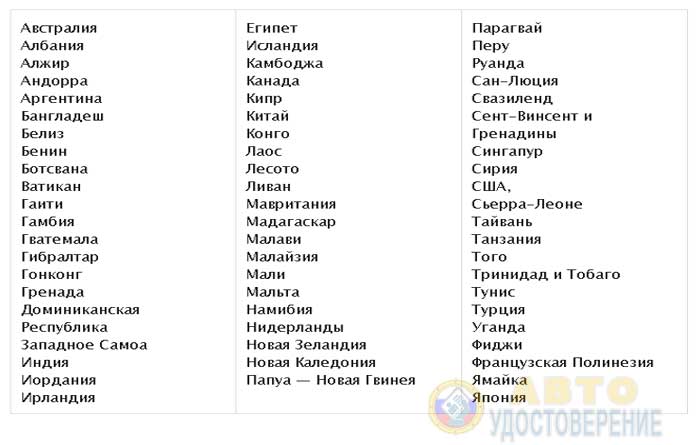Which driver's license can you drive abroad with?
For many Russians who are going to travel abroad, the question of the possibility of driving a car there with a Russian driver's license becomes relevant and is it necessary to obtain any other document for this?
According to Russian rights, which were received earlier than March 1, 2011, it is definitely impossible to travel abroad. This rule applies even to countries that have signed the Vienna Convention (we wrote information about what this convention is and which countries are signatories here).
Starting March 28, 2011, all states, including Russia, in accordance with the new amendments to the Vienna Convention of 1968, must bring their country's national driving licenses (VU) to a single standard.
In this regard, in March 2011, a new type of VU began to be issued on the territory of Russia. The appearance of this document, as well as its content, are in full compliance with the latest amendments to the Convention on Road Traffic. For this reason (according to paragraph 2 of article 41 of this document), the Russian rights of the new type are valid in all countries that have signed the Vienna Convention. Therefore, it is not necessary to obtain an IDL (International Driving Permit) in addition to new rights.
These innovations seem quite logical, but in real life, our compatriots are faced with some points that should be considered in detail.
Do I need to get International in addition to my Russian driving license to travel abroad?
As practice shows, such questions turned out to be quite relevant. Even some of the MREO employees say that in the case when the old VU has not yet expired, you can go abroad with this document.
In addition, there is an opinion that in order to travel outside of Russia (having a new type of VU), it will be mandatory to additionally issue and obtain an international certificate for unhindered driving abroad. The reason in this case, for example, is the lack of a new sample of the French translation of their name on the VU, namely: “Permis de conduire”.
How to act more expediently?
Is it necessary to translate the name of the document "Driver's license"?
According to the international requirements for registration of a driving license (Appendix 6 of the last amendments to the Vienna Convention of 1968), it is quite enough to have an inscription in Russian on the document “Driver's license”. 
Are our old Russian rights considered valid abroad now?

For complete clarity, it should be noted that the old-style VU never had full compliance with the requirements of international standards. In accordance with Annex 6 of the latest amendments to the Vienna Convention of 1968. the norm is the designation in the WU in numbers, and not in words, of such information about the owner as the date of issue, place of birth, etc.
It was this discrepancy that caused the fact that in some European countries our compatriots could not rent a car.
We can not say that now the situation has changed radically. As a result, in those countries where the issue of whether a driver has an old VU was approached condescendingly, and today they will not particularly find fault. And where there was no special trust, it is not recommended to take risks. It is better to get a new type of VU or international driving license (you can get both documents for reliability).
Do I need to get International driving license?
To travel to countries that have signed the Geneva Convention, a prerequisite for drivers is the presence of an International VU (the list of these countries has not changed).

When do you need an International Driving Permit?
It is recommended to obtain an international driving license in all cases when you plan to drive a car in other countries during a trip abroad. This applies even to drivers with new Russian driving licenses.
Why apply for an IDP if the new Russian driving license meets the requirements?
The uniform standard of documents for the right to drive a vehicle (TC) is defined by the Vienna Convention, which was signed on October 8, 1968. If approached formally, then a driver who has a driving license that meets the requirements of this convention can move in a vehicle on the territory of all signatory countries (in this case, an IDL is not required).
However, it cannot be said that in practice the situation fully complies with this rule, since:
- Many countries have legislation that determines the possibility of car rental for foreigners only if they have international rights. In addition, the presence of an IDP is a mandatory item when signing an insurance contract;
- The presence of a Russian driver's license can cause problems in the proceedings with the police. For example, in Italy, a foreigner for driving a vehicle without international rights can be fined 300 €;
- To travel abroad of the Russian Federation on your own car, the driver (when applying for a visa) may be required to have a copy of the IDL.
From the above information, we can conclude that the presence of international rights is necessary even in the case of driving a vehicle on the territory of the signatory countries of the Vienna Convention. At the same time, it should be borne in mind that not all countries have signed this convention. Some states, when determining their own requirements for driving documents, are guided by the Geneva Convention, which was signed much earlier (September 19, 1949). In these states, the management of the vehicle assumes that the driver has both Russian and international rights.




